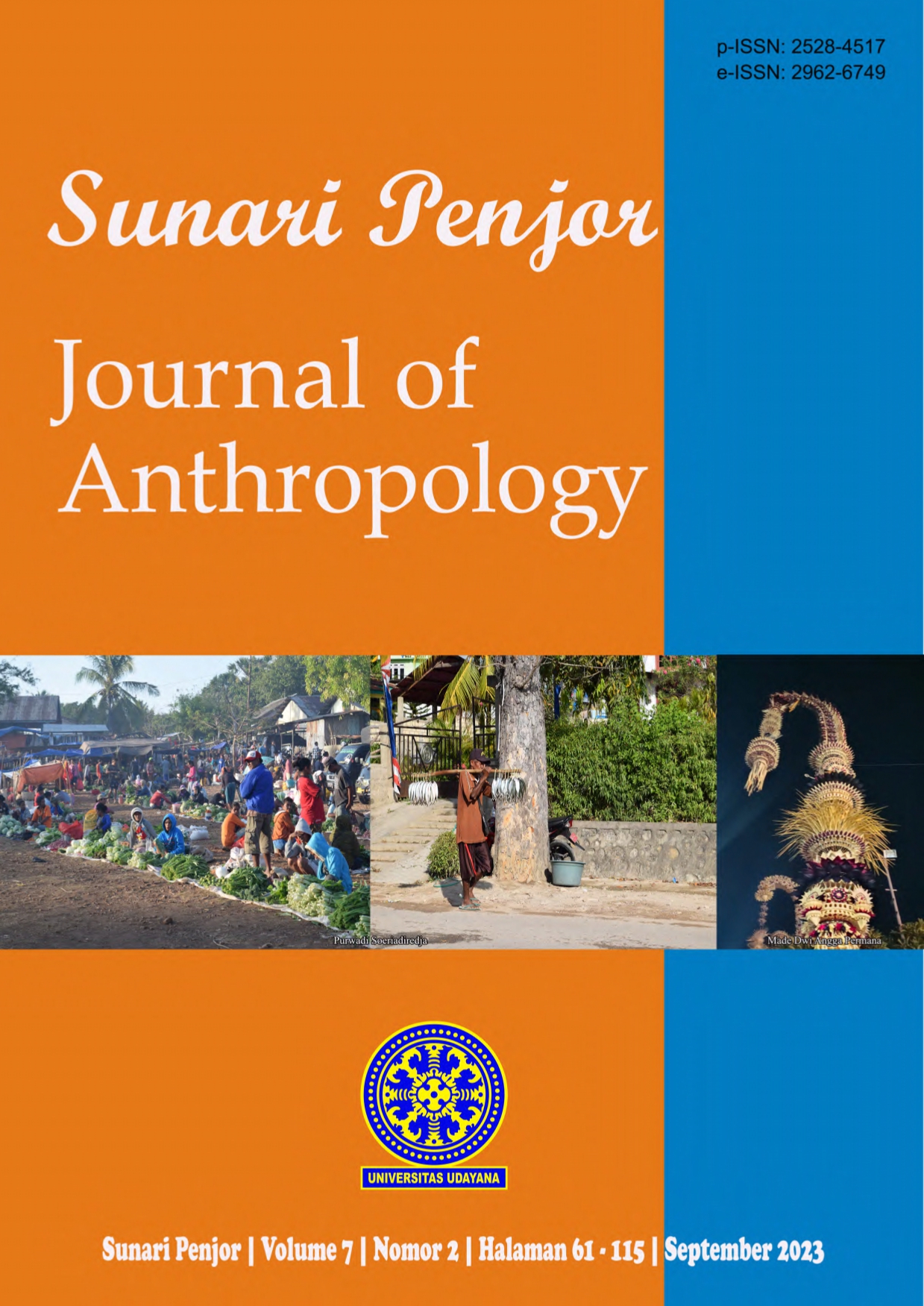Perawatan Tradisional Ata Pesi pada Era Kesehatan Modern di Tueng
Abstract
Research related to traditional or pesi care in the Tueng Village community was studied by applying the theory of the Foster & Anderson medical system and the theory of the Hierarchy of resort Romanucci-Ross. The concept used as a reference in this research is the ata pessi and modern health. The method used is a qualitative research method, by collecting data including the determination of informants, observations, interviews, literature studies, and data analysis. The results showed that the people of Tueng Village still carried out pregnancy and childbirth care by ata pesi. This is influenced by the community's view of ata pesi which is inseparable from the socio-cultural life of the local community. There is also the process and mechanism of traditional ata pesi care in assisting the delivery process, namely, first or pesi doing cikeng, second entap wall, third poro putes, fourth cear sumpe ceremony. Factors that influence people still maintain traditional or pessary care, among others, distance, economic affordability, cultural similarities, hereditary factors.
Downloads
References
Endraswara, S. (2003). Mistik Kejawen: Sinkretisme, Simbolisme, dan Sufisme dalam Budaya Spiritual Jawa. Narasi.
Fitriani N. & Eriyanti F. (2020). “Relasi Pengetahuan dan Kekuasaan Dukun dalam Pengobatan Tradisional pada Masyarakat Dusun Lubuk Tenam Kecamatan Jujuhan Ilir Kabupaten Bungo Propinsi Jambi”. Jurnal Riset Tindakan Indonesia, 5(1), pp. 27-35. https://doi.org/10.29210/3003475000
Foster & Anderson. (2015). Antropologi Kesehatan. Universitas Indonesia (UI-Press).
Handayani, L. (1994). “Peran Dukun Bersalin Tradisional Dalam Perawatan Kehamilan, Pertolongan Persalinan, Perawatan Pasca-persalinan dan Kepercayaan di Kabupaten Tulung Agung” Jurnal Populasi, 5(2), pp. 63-73. https://doi.org/10.22146/jp.12229
Janggur, P. (2010). Butir-Butir Adat Manggarai. Yayasan Siri Bongkok.
Koentjaraningrat. (1994). Seri Etnogratfi Indonesia No.2 Kebudayaan Jawa. Balai Pustaka.
Malinowski, B. (1927). Sex And Repression In Savage Society. Rourledge & Kegan Paul Ltd.
Nggoro, A.M. (2013). Budaya Manggarai Selayang Pandang. Nusa Indah.
Nurhidayanti. S., Margawati. A., & Irene, M. (2018). “Kepercayaan Masyarakat terhadap Penolong Persalinan di Wilayah Halmahera Utara”. Jurnal Promosi Kesehatan Indonesia, 13(1), pp. 46-60. https://doi.org/10.14710/jpki.13.1.46-60
Retno, M. (2008). “Pengobatan Tradisonal Dukun Beranak: Regulasi dan Kebutuhan Masyarakat Dikaitkan dengan Angka Kematian Ibu di Kabupaten Grobongan”. Tesis Universitas Katolik Soegijapranata Semarang.
Setyawati, R. (2014). “Peranan Dukun Bayi dalam Perspektif Masyarakat Jawa terhadap Proses Persalinan di Dusun Noloprayan Desa Jatirejo Kabupaten Semarang Jawa Tengah”. Skripsi Fakultas Ilmu Tarbiyah dan Keguruan Universitas Islam Negeri Syarif Hidayatullah Jakarta.
Sugiyono. (2016) Metode Penelitian. Alfabeta.
Susanti, M. R., Sawitry & Prasida, D. W. (2017). “Persepsi Ibu tentang Pijat Bayi yang Dilakukan oleh Dukun Bayi di RW I Kelurahan Susukan Kecamatan Ungaran Timur” Jurnal Smart Kebidanan, 3(1). https://doi.org/10.34310/sjkb.v3i1.53
Wardani, T.A. K. (2020). “Faktor-Faktor yang Berhubungan dengan Pemilihan Penolong Persalinan Pada Puskesmas Kecamatan Pakuhaji Kabupaten Tangerang Propinsi Banten”. Skripsi Kebidanan Politeknik Kesehatan Jakarta III.














